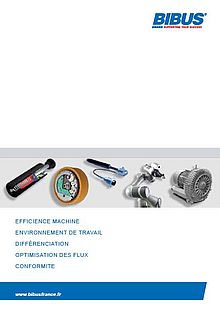Towards more sustainable industrial practices through technology

The industries that recognize that they have the most impact on the environment are the ones that are taking the most steps to develop more sustainable practices.
Constrained by a legislative framework, companies must increasingly integrate sustainability values into their strategy.
And in the ecological transition, the agricultural industry has a key role to play. Increasingly aware and constrained, it is adopting new, more sustainable practices and entering a new era through technological innovation.
How is the rise of new farming tools helping this industry reduce its environmental impact?
Robotics to the rescue of plant crops
To preserve the environment and natural resources, laws are increasingly encouraging farmers to adopt new practices to reduce the use of phytosanitary products that impact consumers, soils, aquatic environments and biodiversity.
This reduction requires tedious and time-consuming tasks (weeding, mulching) and a large amount of farm labor.
Technological innovations facilitate the implementation of new practices that promote production that preserves natural resources, consumer health, operator safety and farm competitiveness.
● Autonomous mobility in cultivated fields.
Constantly evolving, agricultural robots are equipped with highly sophisticated technologies such as image recognition, visual perception of the environment, geolocation and artificial intelligence. They are programmable, adaptable to the needs of the farmer and allow to perform heavy tasks in an autonomous, efficient and highly precise way.
These robotic solutions replace manual work. New practices then bring the environment and economic requirements into symbiosis, as they allow for better productivity without destructive impact on the environment.
● The robotization of agricultural tasks
On farms, these robots make it possible to control weediness, eliminate mulching, reduce work time on the plots and the cost of weeding. They allow to reduce or even eliminate chemical weed killers and to better control the quantity of seeds. The crops are less diseased and naturally more resistant.
Whether in organic or conventional agriculture, automatic weeding contributes to reducing the use of pesticides and reorganizing work time.
Oz and Dino are programmable robots developed by Naïo Technologies to automate tedious tasks such as weeding, hoeing, sowing, planting, and furrowing in vegetable and tree crops. Each robot can be equipped with different tools for different tasks.
Thanks to these agricultural robots, farmers can achieve precise mechanical weeding.
In order to face economic, ecological and social issues, more and more winegrowers are adopting the driverless Vitibot straddling robot. It allows to drastically limit the use of chemical weed killers in the vineyards, to respect the ecological standards while having a shortage of manpower.
Equipped with an I&W electric drive motor, Vitibot robots operate autonomously with 100% electric energy and therefore without CO2 emissions, making their integration into the production process more consistent and responsible.
The versatile Vitirover robot also facilitates the implementation of sustainable practices. In vineyards and arboriculture, it mows grassy soils and eliminates pesticides that are harmful to the soil, biodiversity and consumers. Autonomous, it works with solar energy.
Versatile, adaptable, precise, the CEOL robot is designed to carry out agricultural work such as sowing, fertilization, weeding and harvesting in complete autonomy. Thanks to its hybrid engine, it emits little fossil energy, four times less than a conventional tractor.
The objective of the transformation of agricultural industry practices is to produce better and responsibly. This is why small, medium and large farms have every interest in integrating autonomous agricultural robots because they have three major interests
ecological, economic and social.
Technology for the preservation of natural resources
Economy of means, closed circuit production and limited use of natural resources, are aquaponic farms the ecological alternative to intensive agriculture?
intensive agriculture?
● Aquaponics
Aquaponics is a method of agricultural production that produces plant crops and fish in an ecosystem. The hydroponic system, i.e. the cultivation of plants, works through the aquaculture system and conversely, the fish grow through the plants.
The dejections of the fish enrich the water with natural fertilizers, the plants feed on them, filter the water and purify it for the fish.
This self-sustaining environment works through chemical processes that require oxygen, such as nitrification, during which aerobic bacteria convert ammonia into nitrates.
The most important factor for the system to be viable is the oxygenation of the ponds. Different oxygenation solutions are available to optimize the chemical processes. For example, an air compressor and a fine bubble diffuser are required to ensure that the system interacts in the right conditions.
With these simple and effective solutions, the agricultural industry can integrate new sustainable practices to produce plants and proteins and feed people locally and nationally. Aquaponics offers many benefits to produce in an environmentally friendly manner:
● Preservation of natural resources. Aquaponics works in a closed circuit which allows to save fresh water. Its contribution is limited, because the water of the fish is renewed thanks to the biofilter of the plants and then reinjected into the fish pond and so on.
● Respect for the environment and health. Aquaponics culture does not use pesticides responsible for the pollution of farmland, aquatic environments and health problems.
● Rest of the land. In addition, soilless farming prevents soil depletion due to monocultures and chemical inputs.
● Local and responsible production. One of the great advantages of aquaponics is its adaptability. It can be installed anywhere in the city, on the roofs of buildings, or nearby. This makes it possible to offer consumers products in short circuits, thus reducing the transportation of goods.
Aquaponic farms are still struggling to spread throughout the country, yet their development now makes it possible to combine industrial agriculture and the ecological transition.
Agriculture needs disruptive technological innovations to systematically integrate sustainable practices that respect the environment. In recent years, precision robots and innovative solutions have been developed to help agricultural manufacturers in the agroecological transition.
BIBUS France contributes to the implementation of environmentally friendly practices by offering efficient solutions such as I&W electric drive motors or Secoh air compressors.























